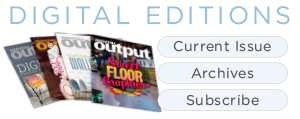By Olivia Cahoon
Print service providers (PSPs) increase profits by printing on unique substrates. Specialized materials go beyond what is used every day in print shops and tap into undiscovered elements like yoga mats, tree round slices, window shades, and bulletproof vests. The ability to print on these materials offer clients an edge over the competition.
Top of the Line
PVS In-Store Graphics is a retail graphics manufacturer based in Portland, OR, providing consulting, design, engineering, and project management for 2D and 3D printing including large format, vinyl graphics, die cutting, finishing, and fulfillment.
The shop began in 1991. 25 years later the company specializes in packaging production for world-renowned athletes and creates theatrical experiences for retail. With 38 employees, and a work space of 35,000 square feet, PVS serves large brands worldwide.
Wes Shinn, co-owner, PVS, shares that the PSP prints 40 percent of its work on unique substrates like plywood and plank wood. He says these are popular in retail environments. 60 percent of its work is considered superwide or over 96 inches in width.
The PSP uses media products from an array of vendors. “Our media comes predominantly from 3M Commercial Graphics, rigid substrates from 3A Composites USA Inc., and for roll stock, a lot comes from Sonoma Graphic Products or Aberdeen Fabrics, Inc.,” explains Shinn. Specifically, the shop uses 3A Dibond, Gator, and Sintra; 3M Wrap Film Series 1080; and Aberdeen 1515 Aberdeen Heavy Knit 8064.
Since 2005, PVS has housed EFI VUTEk products. Its had the EFI VUTEk GS3250LX Pro for three years, the EFI VUTEk HS100 Pro for two years, and recently it purchased the EFI VUTEk FabriVU 340. Using EFI VUTEk printers, PVS has printed on garage doors, gold plates, shoe parts, and pretty much anything it can get into the machine.
ACX Plywood
Recent trends in printing to unique substrates influence PVS. Customers develop creative ideas for printable products. “This causes us to push our limits, or stay ahead with new ideas for treatments, applications, and more,” says Shinn.
There are challenges associated with printing on specialized materials. Shinn shares that custom projects don’t leave much room for error. When the shop is printing a unique piece, it generally only has one shot to print on it. Custom built parts can be as expensive as $10,000, further impacting the pressure to get it right the first time.
“Not all objects are meant to be printed on, so we have to figure out where the settings need to be to achieve the right effects,” he explains.
PVS serves repeat customer of seven years, Chrome Industries, a global manufacturer of messenger bags, backpacks, footwear, and cycling apparel for city living. “Chrome is all about durability for the hardest-core bike riders—professional messengers, fixed freestyle riders, and urban commuters—people who live and ride in the city,” says Shinn.
Recently, Chrome requested a display to showcase its products in multiple retail environments including its Tokyo location. “When we started, we wanted a look that was rough, but cool and innovative,” shares Shinn. The shop used unique substrates—specifically ACX plywood—as one of the elements to achieve this goal. Printed and fabricated fixtures, aluminum tubing, reincorporated LED lighting, milled and beveled wood, and several traditional print processes like magnetic and stretch fabric light boxes were all incorporated into the final piece.
The company had a week from job submittal to put the finished products into a container for shipment to Tokyo. PVS used an EFI VUTEk GS3250LX Pro printer. A combination of finishing equipment from Esko, Kern Laser Systems, ShopBot Tools, Inc., and Zünd were used to complete the project.
“Finishing was challenging due to the various substrates and processes required to complete the complex assembly,” explains Shinn. However, the company pulled through to deliver an appeasing display. “Chrome is particularly excited about the Tokyo project because it is its first venture into Asia,” he adds.
Printing to a specialized material like ACX plywood added a fun element to the overall design and provided the message Chrome hoped to convey to Asian bicyclists.
Unique Substrates
The definition of what constitutes a printable substrate continues to change. Demand for printing on different materials is increasing. Shops like PVS print on a range of media including plywood and plank wood to achieve’ specific requests.
Jan2017, Digital Output



